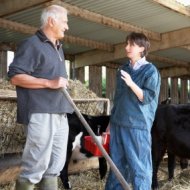Farmer-vet relationship 'must be maintained'

From May 1, APHA will manage TB testing in England through five delivery partners.
Farmers are concerned they may have to pay to keep using their own vet for TB tests, due to changes in the way these tests are delivered.
The National Farmers Union (NFU) raised the concerns yesterday (February 17), after the APHA revealed it had awarded five contracts to veterinary businesses who will allocate TB testing work to vets in England.
NFU's deputy president Minette Batters said it is vital that farmers can continue to use their own vet without having to pay testing costs.
"The long-term relationships farmers build with their vets are hugely important for all aspects of animal health and welfare, and especially regarding bovine TB.
"These vets have often worked closely with farmers for many years, building up trust, knowledge of the farmer’s business, and a working relationship which allows them to have informed and detailed discussions about how best to keep bTB, and other diseases, out of their herds."
Currently, testing is carried out by private vets who are appointed, trained and paid by the APHA. From May 1, however, APHA will manage TB testing through five delivery partners, all of whom are part of XL Farmcare.
Under the new system, delivery partners must offer testing work to veterinary businesses within their region. Farmers may request a particular vet to carry out their testing, and APHA says this will be honoured where possible.
However, Ms Batters said the NFU is concerned that testing on smaller farms or those with more complicated tests will cease to be economically viable for their local veterinary practice.
Responding to the news, the BVA said it would be monitoring the impact of the changes and feeding any concerns raised by its members back to Defra and the APHA, with particular attention paid to "any erosion of the link between vets and farmers and the potential impact of a loss of veterinary services in rural areas."



 RCVS Knowledge has welcomed Professor Peter Cockcroft as editor-in-chief for Veterinary Evidence.
RCVS Knowledge has welcomed Professor Peter Cockcroft as editor-in-chief for Veterinary Evidence.